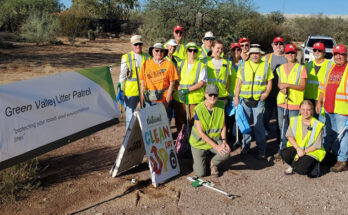Contributed Article/Courtesy House of Representatives
PHOENIX – On Tuesday, State Representative Gail Griffin, Chairman of the House Natural Resources, Energy & Water Committee, advanced HB2572 out of the Senate Natural Resources Committee with an amendment that increases local control over groundwater management and provides exemptions for small farmers from the non-expansion requirements of a Subsequent Active Management Area (AMA).
The small farmer exemption was offered at the request of constituents in Cochise County, who say small family farms should be able to continue growing their businesses—up to a certain amount of land—if they had purchased land prior to the AMA’s designation and had bona fide plans to grow.
Representative Griffin’s amendment adopts the exemption at 320 acres (half a section of land) and ensures that it applies to all Subsequent AMAs—including those not previously designated as Irrigation Non-expansion Areas (e.g., Willcox AMA).
“Rural Arizonans have spoken, and Republican lawmakers have listened,” said Representative Griffin. “Most concerns have centered on large, industrial users—not small family farmers. Big operations can absorb increased regulation; small ones can’t. That’s unfair. This exemption gives family farms — like vineyards, ranches, and local growers — a chance to pursue the expansion plans they had in place. We must preserve the American Dream in rural Arizona and allow our small farms to thrive.”
The amendment also reforms the Groundwater Users Advisory Council (GUAC) structure for Subsequent AMAs to enhance local oversight. Instead of the Governor appointing members, local county boards of supervisors would make those appointments.
To ensure alignment with local interests, members must be Arizona residents, groundwater users within the AMA, and subject to recall.
Additionally, the amendment rebalances authority between the GUAC and the Director of the Arizona Department of Water Resources (ADWR). Under the current framework, the Director unilaterally sets the local management goal and plan, with no obligation to consider GUAC input. Representative Griffin’s amendment shifts this authority to the GUAC, empowering local stakeholders to set those goals and plans themselves.
“Local communities have consistently asked for a stronger voice in groundwater decisions,” said Representative Griffin. “Today, we’re flipping the script—empowering rural communities to manage their own resources, as they’ve requested. Local boards of supervisors will select their own advisory councils, and those councils will finally have real decision-making power.”
Representative Griffin’s amendment aligns with her broader goal of making existing groundwater tools more workable for rural areas—where Subsequent AMAs were always intended to be used.
While urban regions like Phoenix, Tucson, and Prescott were covered by “Initial” AMAs under the 1980 Groundwater Code, rural areas were left to be designated later under the “Subsequent” AMA framework. However, that framework mirrored the one used in urban areas, leading to unintended consequences for rural housing, agriculture, and economic development.
With this amendment, HB2572 resets the framework. It offers a redesigned, rural-compatible approach to Subsequent AMAs—providing conservation tools while allowing for more flexibility, economic opportunity, and locally driven groundwater stewardship.
HB2572, as amended, passed the Senate Natural Resources Committee on a party-line vote, with all Republicans voting YES and all Democrats voting NO.
Gail Griffin is a Republican member of the Arizona House of Representatives serving Legislative District 19, which includes areas of Greenlee, Graham, Cochise, and eastern Pima and Santa Cruz Counties. She also serves as Chairman of the House Natural Resources, Energy & Water Committee.









